John Hurrell – 17 February, 2016
'Corrugations' is fascinating despite the fact that the show is crammed into a room that is far too small. It shows an artist thinking about processes and image construction, but not as preoccupied with popular appeal and quick recognisability as you might suppose. Surprisingly it seems to reference early seventies artists like Serra, Nauman and Smithson with their preoccupation with verbs and manual actions. Thomson, though, is besotted with iron sheets, and how he can transform them.
Christchurch
Jeff Thomson
Corrugations: the Art of Jeff Thomson
Curated by Penny Jackson
4 December 2015 - 28 March 2016
Jeff Thomson is extremely well known for his corrugated iron letter boxes, life-sized cars and dramatic African animals - he’s been around for decades - but this Tauranga Art Gallery initiated show is illuminating because it focuses on a far wider range of interests and sculpture making techniques. It shows that his income-earning ‘brand’ is one thing, but the depth of his intellectual curiosity is another.
Corrugations is fascinating despite the fact that the show is crammed into a room that is far too small. It shows an artist thinking about processes and 3D image construction, but not as preoccupied with popular appeal and quick recognisability as you might suppose. Surprisingly it seems to reference early seventies artists like Serra, Nauman and Smithson with their preoccupation with intransitive verbs and manual actions. Thomson, though, is besotted with iron sheets (corrugated or flat), and how he can transform them.
Different stages of iron manipulation are set out so we can see examples of braiding, knotting, French knitting, weaving, stacking, cladding using rivets, moulding and casting (of nail heads), lacemaking (making filigrees with a plasma cutter), ink-patterned silk screening (of roofing, house walls and downpipes), rippling (making flat sheets corrugated) and so on. Seeing Thomson’s various inventive (and systematic) procedures for spatial exploration laid out with such clarity is thrilling.
My favourite sculptures are the ‘abstractions’ that tend to ignore representation. His printed-over farmyard chooks and riveted pigs are fun but I prefer the morphologically vague contributions that focus on structure, edge and texture. These meandering linear items seem to be bundles or entangled loops of cut lines that could be swirls of crinkly unravelled rope or latticed flax or ribbon.
There is also a suite of images made using the technique known as ‘French knitting,’ where instead of a cotton reel and four brads, Thomson ‘knits’ the steel strips using a much larger trampoline frame and eight looping points. Because, unlike wool, the material won’t contract, his experiments stay flat and spread apart. They don’t turn into linear tubes. However if you look closely around the outer edges you can see the eight circular origins of the process for each work, and the resulting mingled tangle fed in from multiple directions.
Thomson’s use of silk screening to advertise his business, decorate houses and make large posies is also inspired. Using botanical images of plants from reference books or photocopied texts, he makes monstrously energetic, densely layered bouquets, and house cladding or guttering that brilliantly turns every building it contributes to into his artwork.
Full of surprises, this is a dense (and obviously popular) show that will reward repeated visits by anybody interested in contemporary sculpture. Hopefully it will attract other municipal venues besides just three in Tauranga, Whanganui and Christchurch.
John Hurrell
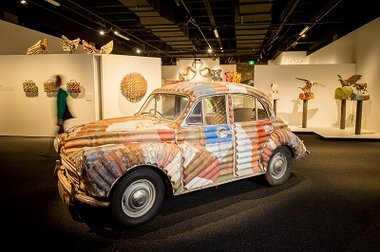
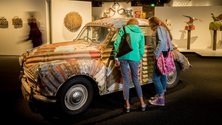
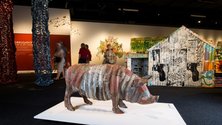
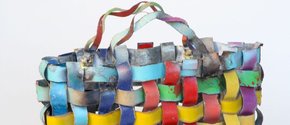




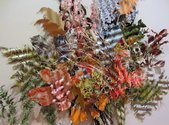
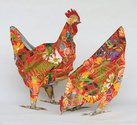
 Two Rooms presents a program of residencies and projects
Two Rooms presents a program of residencies and projects Advertising in this column
Advertising in this column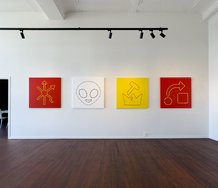
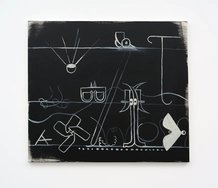
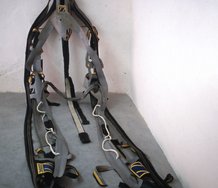
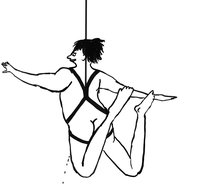
This Discussion has 0 comments.
Comment
Participate
Register to Participate.
Sign in
Sign in to an existing account.